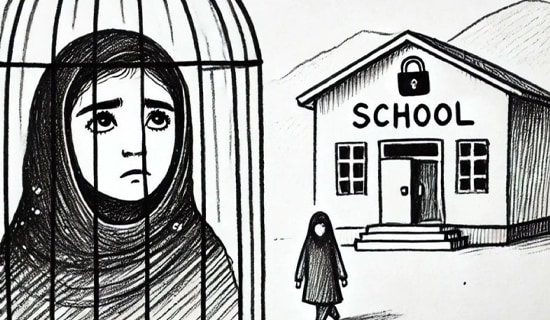
Kashmiris protest against the U.S. designation of Hizbul Mujahideen as an FTO (image: Dawn.com).
Introduction
On August 16, 2017, the U.S. designated the Pakistan-based Kashmiri jihadi group Hizbul Mujahideen a Foreign Terrorist Organization (FTO). The U.S. State Department said in a statement: "Today's action notifies the U.S. public and the international community that HM [Hizbul Mujahideen] is a terrorist organization. Terrorism designations expose and isolate organizations and individuals, and deny them access to the U.S. financial system."[1]
Hizbul Mujahideen is one of around two dozen jihadi organizations that were formed in Pakistan over the past three decades with the singular purpose of waging jihad against India in Jammu and Kashmir. Their operational bases were established in the Pakistan-controlled part of Jammu and Kashmir. These groups were united under the banner of the Muttahida Jihad Council, which is led by Syed Salahuddin. While most outfits are no longer functional, Hizbul Mujahideen, established in 1989, continues to wage jihad in Indian Kashmir with the support of Pakistan. It is led by Yusuf Shah aka Syed Salahuddin, who is a Specially Designated Global Terrorist under U.S. State Department Executive Order 13224.
Jammu and Kashmir is divided by a Line of Control (LoC) between India and Pakistan. After the Pakistani military's Inter-Services Intelligence (ISI), aided by the CIA and Saudi Arabia, brought the Afghan jihad of the 1980s to an end in 1989, the ISI smelled victory against the USSR in Afghanistan. The ISI thought it could achieve a similar feat against India in Kashmir. After the Afghan jihad ended, most anti-India jihadi organizations were formed by the ISI. Lashkar-e-Taiba and Hizbul Mujahideen are the two lead organizations fighting India in Kashmir currently.
This paper reviews the reactions of Kashmiri and Pakistani leaders – as appearing in the Urdu-language and other newspapers published from Pakistan and Pakistani-controlled Kashmir – to the U.S.'s designation of Hizbul Mujahideen as an FTO.
The Protests In Muzaffarabad
Speaking on August 14 – Pakistan's Independence Day and two days before the U.S. designated Hizbul Mujahideen an FTO – Raja Farooq Haider, the so-called prime minister of Pakistani-controlled Kashmir, said: "Kashmiris are with Pakistan on an ideological, not geographical, basis."[2] As indicated in his statement, Pakistan-based Kashmiri leaders like Haider often adopt the ideological line that Kashmir will become part of the Islamic state of Pakistan.
A comment piece in Roznama Ummat, a pro-ISI Urdu daily, criticized the Pakistani government for not taking a clear stand against the U.S. designation of Hizbul Mujahideen as FTO, stating: "The situation would not have come this far if the Foreign Office and government of Pakistan had raised an effective voice two months ago when Syed Salahuddin, the emir of Hizbul Mujahideen, was designated as a terrorist."[3] It added: "By declaring Hizbul Mujahideen as a terror outfit and ordering its assets to be frozen, the U.S. has demonstrated proof of appeasing India, because Hizbul Mujahideen has neither assets nor a bank account in America."[4]
Roznama Ummat also quoted Amjad Shoaib, a retired Pakistan Army general, as saying: "In this region [of South Asia], the United States makes decisions in accordance with India's policy, not its own. Whereas in the Middle East, the U.S. runs Israel's policy."[5] Shoaib added: "Since its interests are connected with those of India in this region... [the U.S.] is describing a resistance movement as a terror group to please India."[6] The Urdu newspaper noted that the U.S. had also announced a reward of "$2.5 million for the head of Hafiz Muhammad Saeed" – the founder of Lashkar-e-Taiba – "but, Allah willing, Hafiz Muhammad Saeed is still present."[7]
A day after Hizbul Mujahideen's designation, there were protests in Muzaffarabad, the capital of Pakistan-controlled Kashmir. "The Hizbul Mujahideen is not a terrorist organization but stands for the sentiments and aspirations of Kashmiris and is the centre of their hopes," read a banner held by the protesters (see top image).[8] The protest rally was addressed by many speakers, including Shaikh Jamilur Rehman, the general secretary of the Muttahida Jihad Council. Rehman told the protestors: "We will carry on with our struggle, which is in accordance with the UN Charter, until the eviction of the last Indian soldier from our motherland."[9]
Uzair Ghazali of Pasban-i-Hurriyat ("the Guardians of Freedom"), one of several anti-India organizations operating from Pakistan, said: "If anyone has to be designated a terrorist in today's world, it is Indian premier Narendra Modi and Israeli premier Benjamin Netanyahu... but both are advancing their ghastly agendas under American patronage."[10] According to a report in Roznama Islam, speakers at the rally described Syed Salahuddin as "the voice of Kashmiris," while the protesters raised slogans against India and in favor of Kashmir's freedom, warning: "The Kashmiris will continue the struggle on every front until freedom from India [is won]."[11]
Columnist Irshad Mahmood wrote: "The act of declaring Syed Salahuddin as an unacceptable individual [i.e. terrorist] and sanctions on Hizbul Mujahideen by international institutions convey a message to Kashmiri youths that the international community is not willing to hear their case. Therefore, youths are losing their trust in international institutions [such as the UN] and day by day they are turning to extremist organizations. Although there is no formal organization of the Islamic State and Al-Qaeda in Kashmir, debates on social media indicate that youths are turning to extremist organizations."[12] Mahmood said that such steps by the U.S. will impact neither the Kashmiris nor Pakistan, but could make gaining international support for the Kashmir issue difficult.

A Pakistan Army statement declared: There is no element of terrorism in Kashmir.
Editorials In Urdu Dailies
Roznama Mahasib is an Urdu daily published from four towns. Its masthead says it was founded in memory of Nasim Hijazi, an Urdu writer whose numerous novels on the subject of the history of Islam and its glory have radicalized Muslim youths in South Asia. In an editorial on the designation of Hizbul Mujahideen as an FTO, Roznama Mahasib wrote: "America is setting aside all the international [diplomatic] tenets and rules in the hatred of Pakistan and in love of India."[13] The Urdu daily added: "It is fast losing its ability to play the role of a third party in this dispute in South Asia. This is not good for the U.S. itself."[14]
Roznama Siasat – an Urdu daily published from Muzaffarabad – published an editorial on the subject, stating: "Kashmir's political, religious, askari [military, militant], [pro-]freedom leadership and public have comprehensively condemned this decision of the U.S.. America is a nation in the business of arms, and the American people are being raised on the blood of the Muslim Ummah. The so-called flag-bearer of democracy and human rights, America, is the worst enemy of the Muslim Ummah.[15] Insofar as Hizbul Mujahideen is concerned, it is an organization active for the Kashmiri people's right to self-determination, and it is not involved in any negative activity anywhere other than Kashmir, neither the Hizbul Mujahideen's mission nor [its] objective are lawlessness and chaos," Roznama Siasat said.[16]
The editorial continued: "The Kashmiris will not compromise on the struggle for their right to self-determination. The U.S.-India alliance and conspiracies will not impact the freedom movement."[17] It added: "The goal of Kashmiris' freedom may be far off, but this freedom is not impossible [to achieve]. America, Israel, and India cannot silence the Kashmiris' sentiments of freedom."[18]
An editorial in Roznama Islam, an Islamist Urdu daily published from Karachi and Lahore, stated: "America promises to play a non-partisan role for the resolution of the issue of Palestine in the Middle East and the problem of Kashmir in South Asia, but the inordinate delay/suspension of both the problems mirrors its double-standards."[19] It said: "India and Israel have continued with their criminal measures [in Kashmir and Palestine] with the complete backing of the U. S.. By getting these long-standing problems connected with the Islamic world entangled in extraordinary complications, the earth has become a laboratory of mischiefs and conflicts."[20] It warned: "America should cease its taste for playing with fire. And it should review its extremist and provocative policies against Islam and the Muslims on the pretext of [fighting for] the end of extremism and terrorism."
The editorial went on to accuse the international community of adopting double-standards in resolving issues that involve Muslims while promptly addressing non-Muslim problems such as South Sudan and East Timor through international forums such as the UN. It said that the world powers are avoiding seeing the ongoing bloodshed in Palestine, Kashmir, Syria, Myanmar, Afghanistan, Iraq, and Yemen.
On August 21, the Inter-Services Public Relations (ISPR), the media department of the Pakistan Army, issued a statement on the issue of counter-terrorism in Pakistan. The statement also declared: "The political struggle will continue in Kashmir; there is no element of terrorism [in Kashmir]" – according to a front page report (see the above image) in Roznama Mahasib.[21]
* Tufail Ahmad is Senior Fellow for the MEMRI Islamism and Counter-Radicalization Initiative
Endnotes:
[1] State.gov (U.S.), August 16, 2017.
[2] Roznama Ummat (Pakistan), August 15, 2017.
[3] Roznama Ummat (Pakistan), August 19, 2017.
[4] Roznama Ummat (Pakistan), August 19, 2017.
[5] Roznama Ummat (Pakistan), August 19, 2017.
[6] Roznama Ummat (Pakistan), August 19, 2017.
[7] Roznama Ummat (Pakistan), August 19, 2017. In 2012, the U.S. announced a reward of $10 million for information leading to the prosecution of Hafiz Muhammad Saeed.
[8] Dawn (Pakistan), August 18, 2017.
[9] Dawn (Pakistan), August 18, 2017.
[10] Dawn (Pakistan), August 18, 2017.
[11] Roznama Islam (Pakistan), August 18, 2017.
[12] Roznama Siasat (Pakistan), August 20, 2017.
[13] Roznama Mahasib (Pakistan), August 18, 2017.
[14] Roznama Mahasib (Pakistan), August 18, 2017.
[15] Roznama Siasat (Pakistan), August 19, 2017.
[16] Roznama Siasat (Pakistan), August 19, 2017.
[17] Roznama Siasat (Pakistan), August 19, 2017.
[18] Roznama Siasat (Pakistan), August 19, 2017.
[19] Roznama Islam (Pakistan), August 18, 2017.
[20] Roznama Islam (Pakistan), August 18, 2017.
[21] Roznama Mahasib (Pakistan), August 22, 2017.




